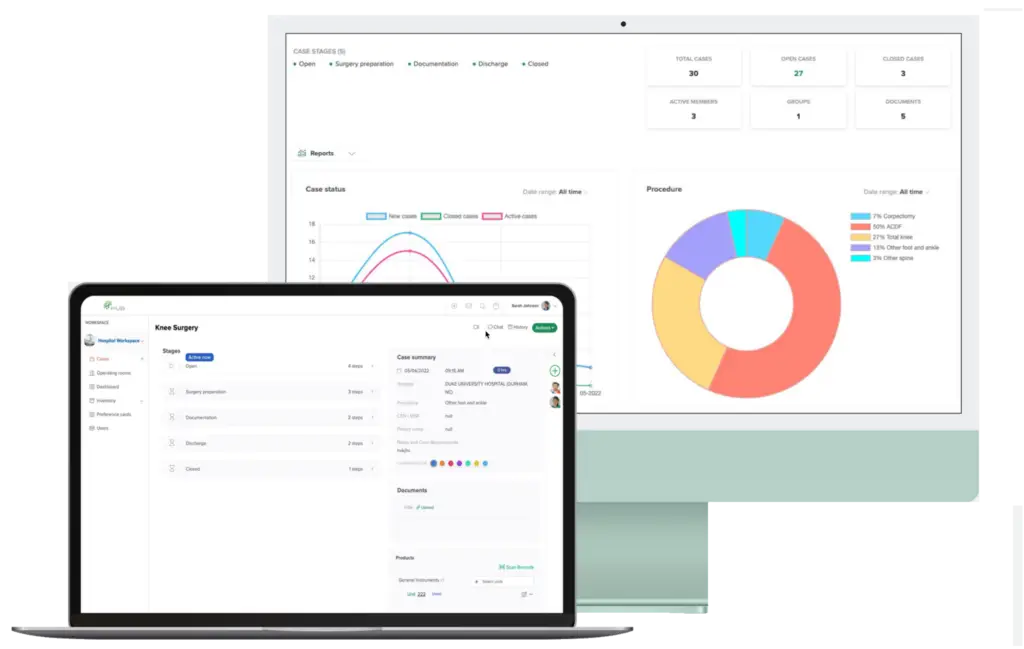Efficient case scheduling is critical for any healthcare facility to ensure optimal resource utilization, reduced patient wait times, and improved overall patient care. HUB Healthcare offers a robust solution for healthcare case scheduling, streamlining the process and enhancing operational efficiency. This post will guide you through the best practices for utilizing HUB Healthcare for case scheduling.

Key Features of HUB Healthcare Case Scheduling
HUB Healthcare’s case scheduling platform is designed to simplify the scheduling process through its advanced features:
- Centralized Scheduling Dashboard: Provides a comprehensive view of all scheduled cases, enabling easy management and adjustment.
- Automated Notifications: Keeps all relevant parties informed with real-time updates.
- Resource Allocation: Ensures optimal use of operating rooms, medical staff, and equipment.
- Conflict Resolution: Identifies and resolves scheduling conflicts automatically.
- Data Analytics: Offers insights into scheduling patterns and operational efficiency.
Best Practices for Using HUB Healthcare for Case Scheduling
1. Centralize Your Scheduling Process
Utilize HUB Healthcare’s centralized scheduling dashboard to manage all your cases in one place. This feature provides a holistic view of scheduled procedures, available resources, and any potential conflicts, making it easier to coordinate and optimize your schedule.
2. Automate Notifications and Updates
Leverage the automated notifications feature to keep surgeons, nurses, anesthesiologists, and other relevant staff informed about scheduling changes in real time. This reduces the risk of miscommunication and ensures everyone is prepared for upcoming cases.
3. Optimize Resource Allocation
HUB Healthcare allows you to allocate resources efficiently by matching the right operating rooms, staff, and equipment to each scheduled case. Use this feature to avoid overbooking and ensure that all necessary resources are available when needed.
4. Utilize Conflict Resolution Tools
Scheduling conflicts can disrupt your operations and affect patient care. HUB Healthcare’s conflict resolution tools automatically identify and resolve these conflicts, ensuring that your schedule runs smoothly and efficiently.
5. Analyze Scheduling Data
Take advantage of HUB Healthcare’s data analytics to gain insights into your scheduling patterns. Analyzing this data can help you identify bottlenecks, optimize your scheduling processes, and improve overall operational efficiency.
6. Continuous Training and Support
Ensure that your staff is well-trained in using HUB Healthcare’s case scheduling platform. Regular training sessions and ongoing support can help your team stay proficient and make the most of the system’s features.
How HUB Healthcare Can Help
HUB Healthcare offers a comprehensive suite of tools designed to enhance case scheduling in healthcare facilities. With features such as a centralized scheduling dashboard, automated notifications, resource allocation, conflict resolution, and data analytics, HUB Healthcare streamlines the scheduling process, reduces errors, and improves operational efficiency. By leveraging these advanced tools, healthcare providers can ensure optimal resource utilization, reduce patient wait times, and enhance overall patient care. Implement HUB Healthcare to transform your case scheduling practices and achieve better outcomes.

Conclusion
Effective case scheduling is vital in healthcare. It ensures timely and organized care delivery, reduces wait times, and enhances patient satisfaction. With the right scheduling system, healthcare providers can allocate resources more efficiently, minimize scheduling conflicts, and optimize staff workload. This leads to improved operational efficiency, allowing for more focus on patient care rather than administrative tasks. Ultimately, effective case scheduling is a cornerstone of quality healthcare service, contributing significantly to better patient outcomes and overall organizational success.
HUB Healthcare’s case scheduling feature is an invaluable tool for today’s healthcare providers. Its comprehensive, user-friendly design simplifies case management, ensuring efficient and effective healthcare delivery. Try HUB and experience a transformative approach to case scheduling in your organization. Care Coordination





